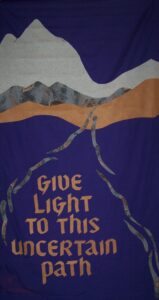Not for Wimps
Let’s say we believe deeply in God, as many of us do. More than that,  at some time we might have prayed for God’s guidance, have experienced God’s presence, and/or have felt and responded to God’s love. What then?
at some time we might have prayed for God’s guidance, have experienced God’s presence, and/or have felt and responded to God’s love. What then?
How can we stay in love with God?1
In 18th Century England, Christian reformer John Wesley told his followers to do certain practices that keep our relationship with God vital, alive, and growing. Some of these actions are prayer, worship, studying the Scriptures, and providing for the needs of others.
Wesley called these actions “means of grace” or “the ordinances of God.” One specific habit that needs to be added to that list, however, is the act of forgiving others and ourselves. That’s a tall order, but it’s essential to grow toward a relationship with God that is healthy and strong.
Hold on a minute: here’s a disclaimer. Contrary to common misconceptions, forgiveness is not basically a feeling. (It’s actually being studied by scientists, who have found it’s based on something more fundamental and lasting than emotion.) Likewise, forgiveness is not forgetting or accepting the violation, or dishonoring the victim, or opening ourselves up to being hurt or betrayed yet again.2
Instead, forgiveness is a choice to acknowledge the hurt and its consequences, and also to decide to live beyond it. It denies the perpetrator continued power over our lives. Forgiving someone is a deliberate behavior, and a skill that can be practiced.3
True forgiveness is not for wimps. It’s often a multi-layered process that may take years to approach completion. Whatever the number of steps you or I work through, several forgiveness scientists note four basic stages: telling the story, naming the hurt, working on forgiveness, and finding release from our emotional prison.4 It depends on all sorts of factors, including the depth of the violation and our own internal layers of struggle.5
What’s important is not some illusive, perfect spiritual endpoint, but the ongoing, often uncertain path on which our hearts travel.
In a way, this up-and-down process of trying to forgive reveals how we’re doing in all of our relationships at any given time: with our family, friends, and neighbors; with God; and with our deepest selves.
The bumpy road of being challenged by forgiveness – and being willing to receive forgiveness from oneself or from others – can be a lifelong process. It’s a good thing we have a whole lifetime to work on it, and maybe beyond that, too, in the life to come.
May your heart’s journey be one of discovery and intimate companionship with the Divine One who is always traveling with you in compassion and love.
Your partner in faith,
Betsy Schwarzentraub
1 – Bishop Rueben Job uses this phrase in his book, Three Simple Rules: A Wesleyan Way of Living. It’s his way of paraphrasing John Wesley’s third General Rule about practicing the ordinances of God.
2 – See Dr. Robert Enright, the initiator of forgiveness studies, in his landmark book, Forgiveness is a Choice: A Step-by-Step Process for Resolving Anger and Restoring Hope, particularly pages 23-68.
3 – Dr. Frederic Luskin, author of Forgive for Good: A Proven Prescription for Health and Happiness, is the Director and Cofounder of the Stanford Forgiveness Projects, Stanford University, Palo Alto, CA. He is the most prominent among many experts when it comes to understanding forgiveness as a learnable skill.
4 – These phrases are closest to those used by Bishop Desmond Tutu and Mpho Tutu in The Book of Forgiving. The stages are fluid and often include relapses and the choice to start again. In Forgiveness is a Choice, Dr. Robert Enright, founder of the International Forgiveness Institute, breaks it down into twenty steps and names the four phases as “guideposts” along the way. Dr. Ilene Cohen offers helpful questions for the reader’s personal response at various points in The Forgiveness Workbook: Cultivate Compassion, Release Resentment, and Find Peace.
5 – In The Sunflower: On the Possibilities and Limits of Forgiveness, Simon Wiesenthal takes on a most challenging question out of his own experience: whether or not to forgive a dying Nazi soldier during World War II. His book includes answers from more than fifty ethicists, spiritual leaders, professors, and activists from around the world.


